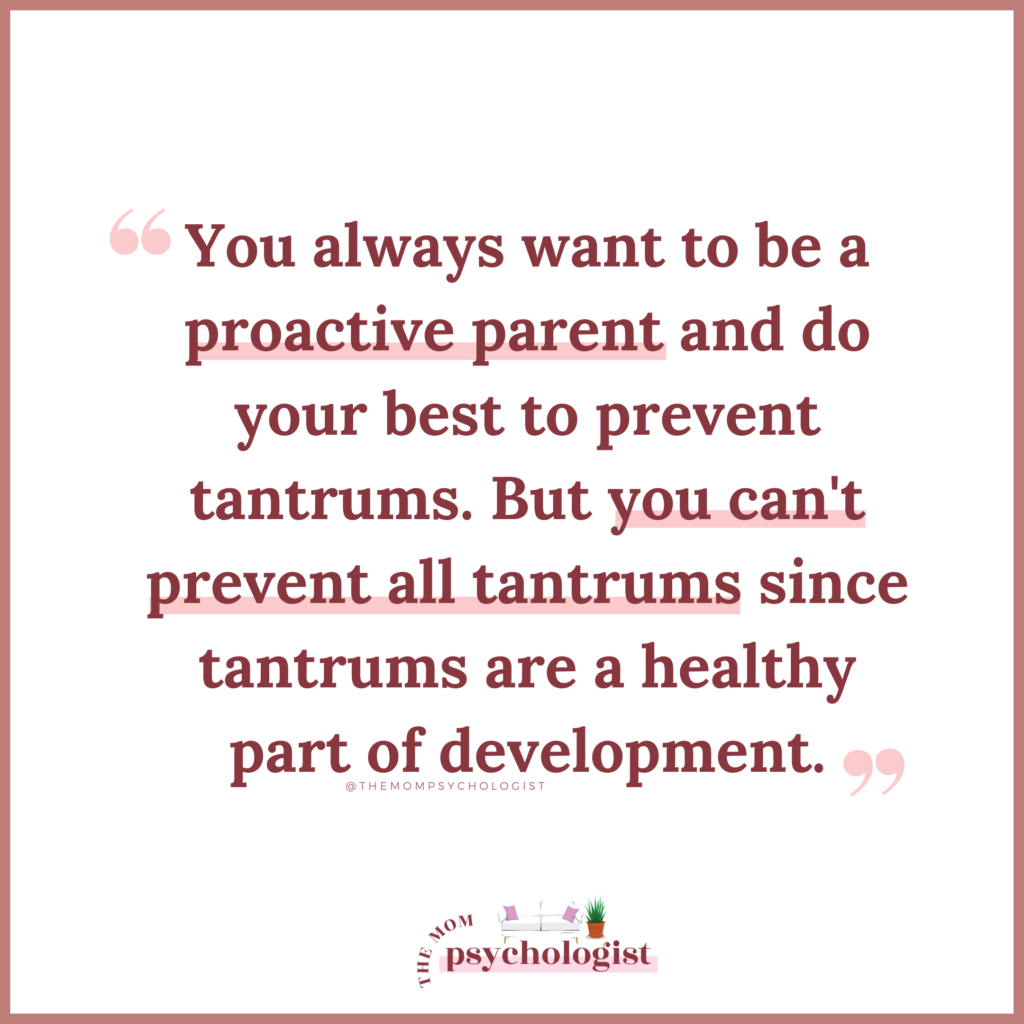watch now!
A place where I discuss all things related to toddlers and motherhood!
Subscribe to my Youtube channel
As a clinical psychologist, published author, and mother to two cheeky young children, I get it. I’ve spent YEARS researching and filtering through the noise online, so you don’t have to.
PARENTING TIPS
POTTY TRAINING
ANTIRACISM
PLAY
Blog Topics
SIBLING RIVALRY
SCREEN TIME
TANTRUMS
DISCIPLINE
Hi I'm Dr. Jazmine
How to Deal with Your Child’s Tantrums Without Losing It: Tips for Staying Calm During Big Feelings
topics:
Did you know that parenting is about 80% mindset and 20% tips and tricks?
When parenting little ones, I truly believe it is more about your thinking, perspective, and mindset as you navigate tantrums and other big feelings. It’s so helpful to have an awareness of what you’re thinking in your mind during the most challenging parenting moments, because that is where the gold is.
I know during tantrums, your mind likes to go all over the place. It likes to tell you all these unhelpful things: “This is an emergency! I need to fix this right away. I need to get my child to stop crying. It’s my job to keep them happy all the time. And I am failing. I am a bad parent. I have a bad child. If they’re like this now, how are they going to be in a couple of years?”
During your child’s tantrums, your brain goes into stress mode and becomes overwhelmed. And when you feel that – when you take those emotions on in your brain – it likes to tell you these unhelpful thoughts.
Building more awareness around what you say to yourself during your child’s tantrums and big feelings is important because it affects how you deal with them.
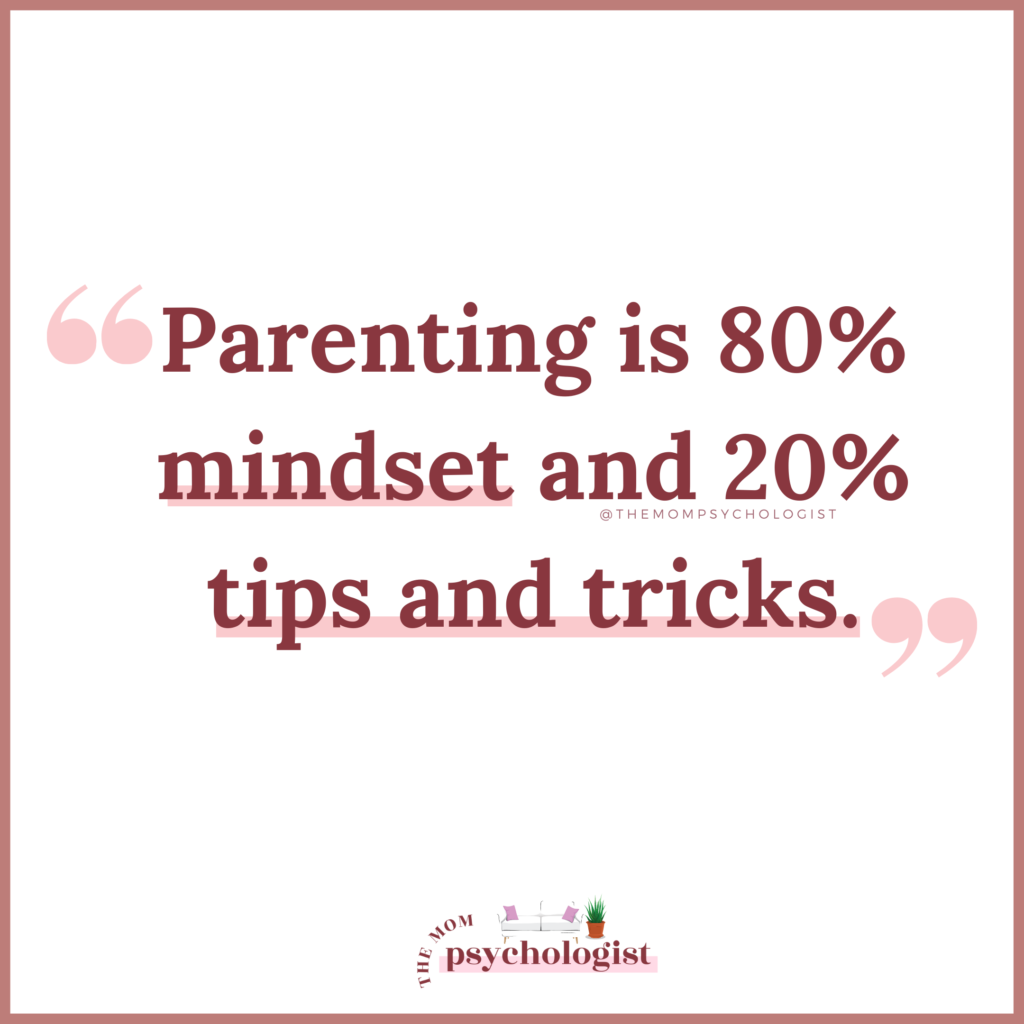

If you are thinking, “I need to fix this, this is an emergency. I have a bad kid. I’m doing a bad job,” you’re more likely going to feel angry. You’re more likely going to handle the tantrum with force and get into a power struggle.
So it’s important to think about your mindset because this will help you stay calm.
Mindset Tip #1: Prepare Your Mind To Expect Your Child’s Tantrums
You always want to be a proactive parent and do your best to prevent tantrums.
But you can’t prevent ALL tantrums, since tantrums are a healthy part of development. It’s good for your child to express their emotions and their feelings with you – so you have to come to expect some tantrums.
So one of the best ways to handle your child’s tantrum is to go into it with the mindset that it’s not about you.
Also, trust the process. Tell yourself, “I trust myself to handle this and show up in this moment. And I trust my child to process their feelings. This is all healthy. I trust this process. Feelings come and go. This tantrum won’t last forever. I’m okay. They’re okay. I’ve got this!”
Mindset Tip #2: Remind Yourself These Are Your Child’s Emotions, Not Yours
Think of yourself in a windy sandstorm, which is your child’s emotions. And all of it is coming around you, but you can stay anchored. You can plant your feet on the ground, and you can wait this out.
These are their emotions. This is their sand, not yours. You need to do what you need to ground yourself through this.
You don’t need to get sucked into their tantrum. This is not an emergency.
It’s okay for them to express their big feelings, and you can have your own emotions too. But to stay calm during their tantrum, say to yourself, “I can stay calm in this. I don’t have to take on their feelings. Those feelings are not mine.”
Remind yourself where you’re at, who you are, and that you can handle this. Remind yourself you’re strong, confident, and competent. Whatever you need to tell yourself to get yourself back into the zone of “I’ve got this. We’ve got this. We’re going to be just fine.”
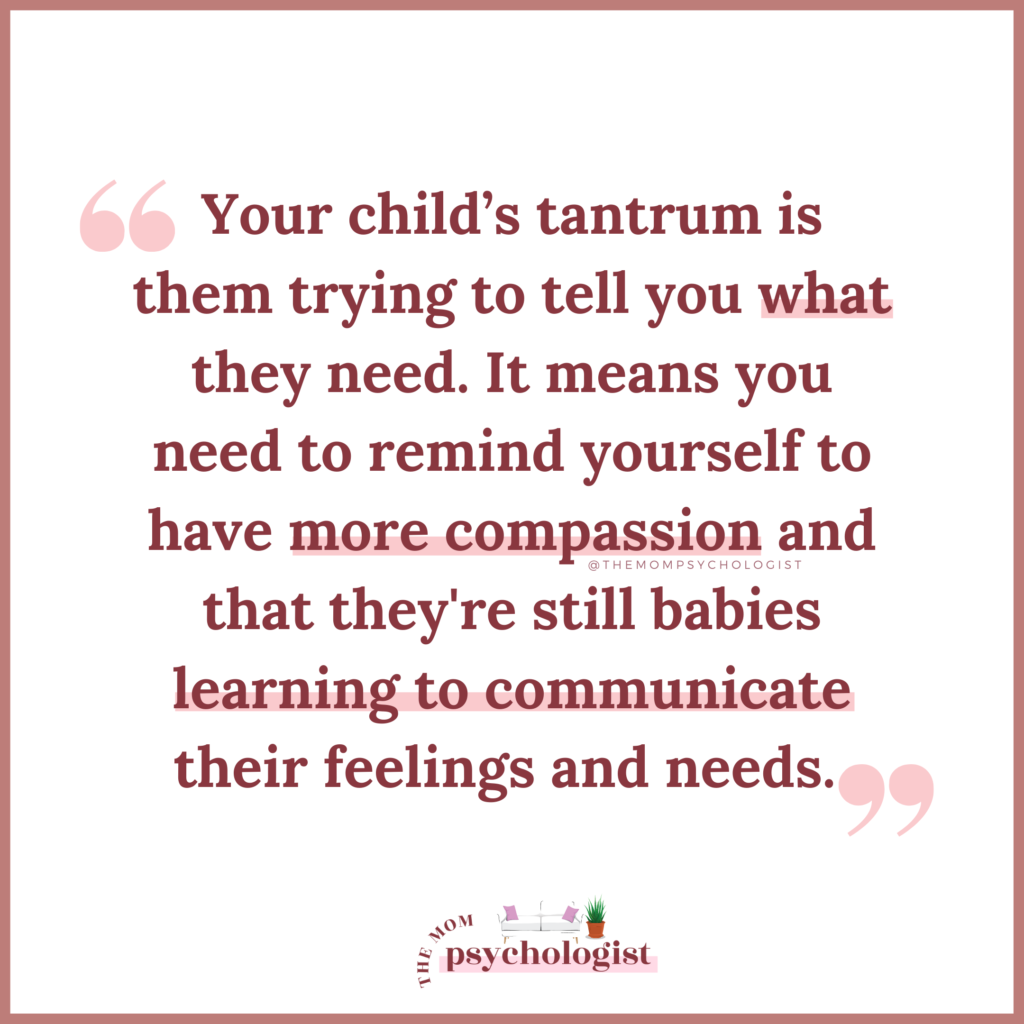
Mindset Tip #3: Don’t Take Your Child’s Tantrum Personally
Go down the list of your child’s needs: Are they hungry? Are they tired? Are they overstimulated? Are they bored? Do they want connection and attention from you? Make sure all of their basic needs are being met.
But even if you’re struggling to meet a basic need, that’s okay. A tantrum is the way your child communicates. It’s so easy to take their tantrums personally and feel you are doing something wrong.
Your child’s tantrum is them trying to tell you what they need.
Think about when your little one was a baby. It was okay for them to cry because you understood on a cognitive level that was their way to express their needs. That is an instinct they have, and it is healthy.
As your child gets older, they learn more skills. They become a bit more sophisticated with communicating their needs to you.
But they’re still babies.
And it’s helpful to remind yourself that though they can talk a bit more and seem more sophisticated, your child is still going to cry to communicate sometimes. This doesn’t mean you aren’t going to help them communicate. Or it doesn’t mean you aren’t going to prompt them to use their words and solve the problem.
It means you need to remind yourself to have more compassion and that they’re still babies learning to communicate their feelings and needs.
So say to yourself in the moment, “My child is still a baby. My child is 2 or 3 or 4. They’ve only been on this earth for 2 years / 3 years / 4 years. They are still learning.”
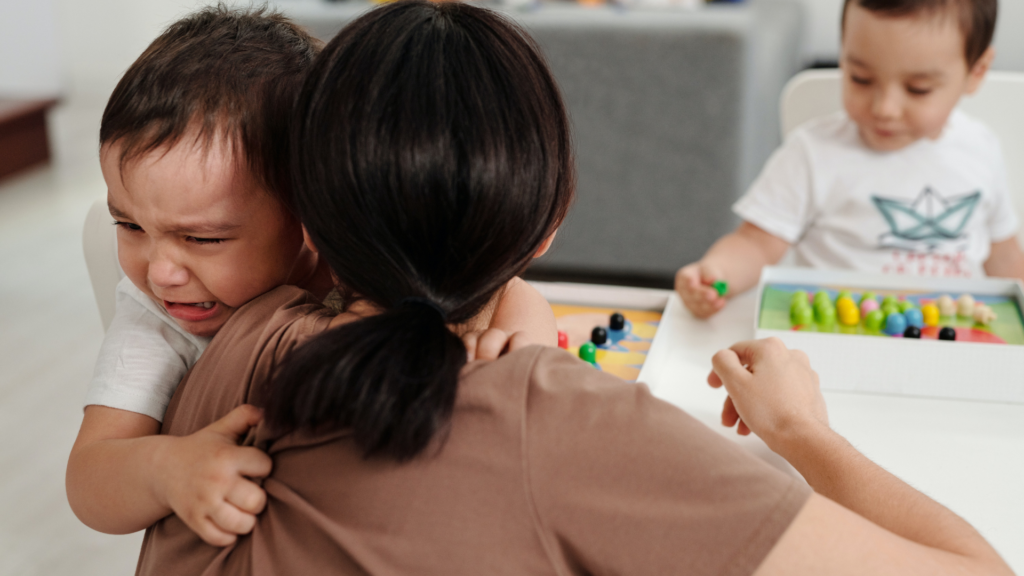
Mindset Tip #4: A Tantrum Is A Healthy Release Of Stress Hormones For Your Child
When you cry, you are releasing stress hormones, which is a good thing. So you don’t want your child to hold in those tears.
If your child is going to school, they’re separated from you for periods during the day. Your child works hard during the day to keep it together – to hold it all in and make friends and play and listen to the teacher or caregiver.
It’s not uncommon that when kids get reunited with you, they want to release all those feelings to you. After all, you are the TRUSTED ONE.
They know they can trust you with their feelings.
This process is good. You want them to share with you how they’re feeling. I know it’s not always pleasant or stress-free. But if you remind yourself this is healthy, it can fight back against your brain telling you to just make the tantrum stop.
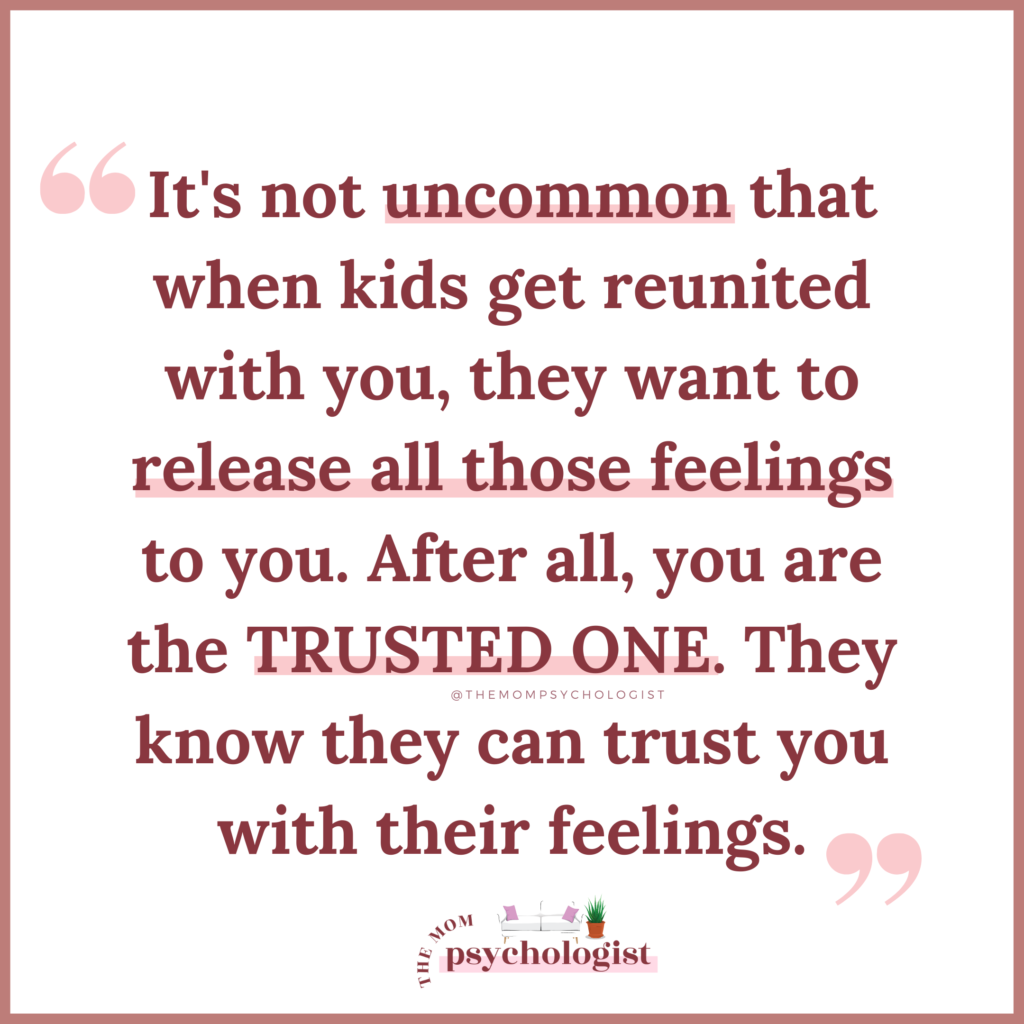
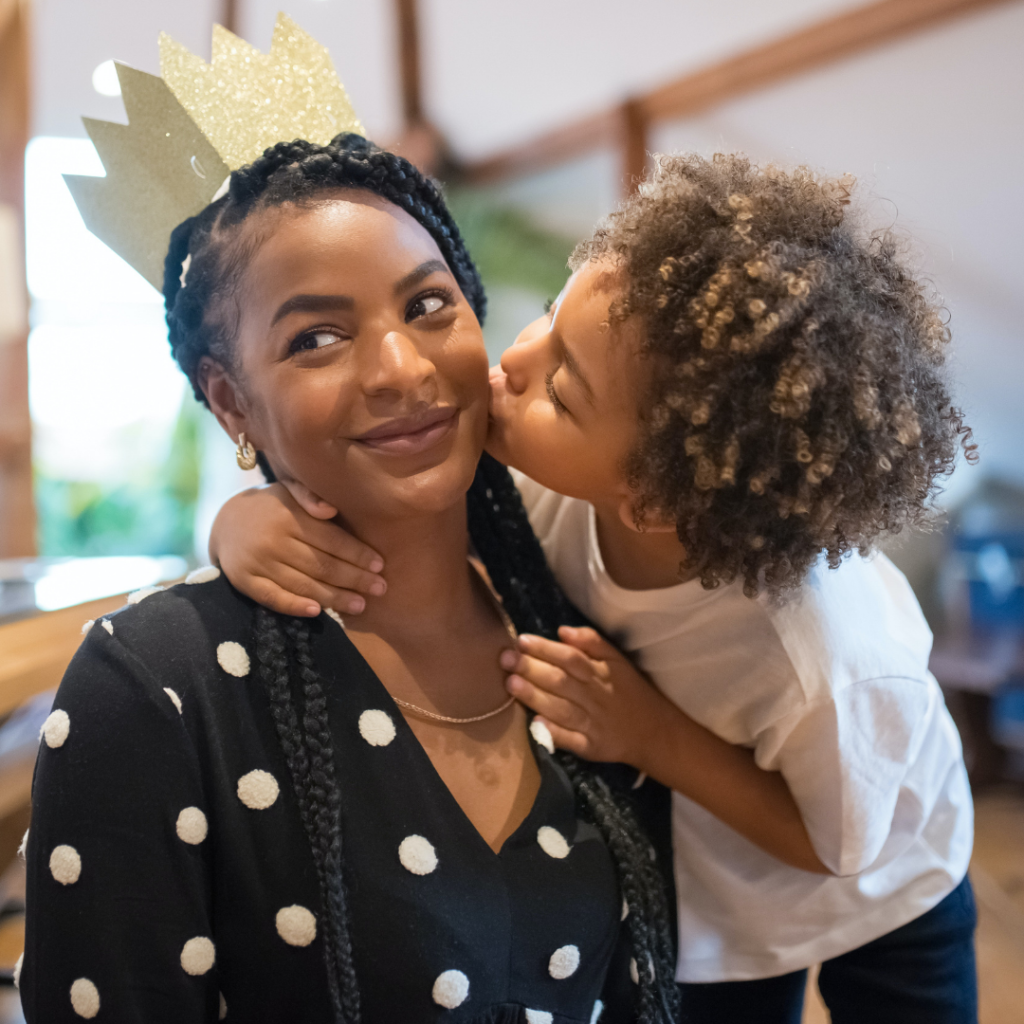
Mindset Tip #5: Minimize Your Words During A Tantrum
As an adult, you’re used to talking things out. You’re used to using lots of communication and try to meet your child with logic when they’re in a heightened emotional state.
Instead, pick 1 to 2 things to say during tantrums.
For example, you can say, “Let it out.” Or “I’m right here. This is hard. We will get through this.”
These words are simple and minimal. By keeping your words simple, you allow your child the space to express themselves. It’ll decrease your urge to meet your child’s tantrum with logic.
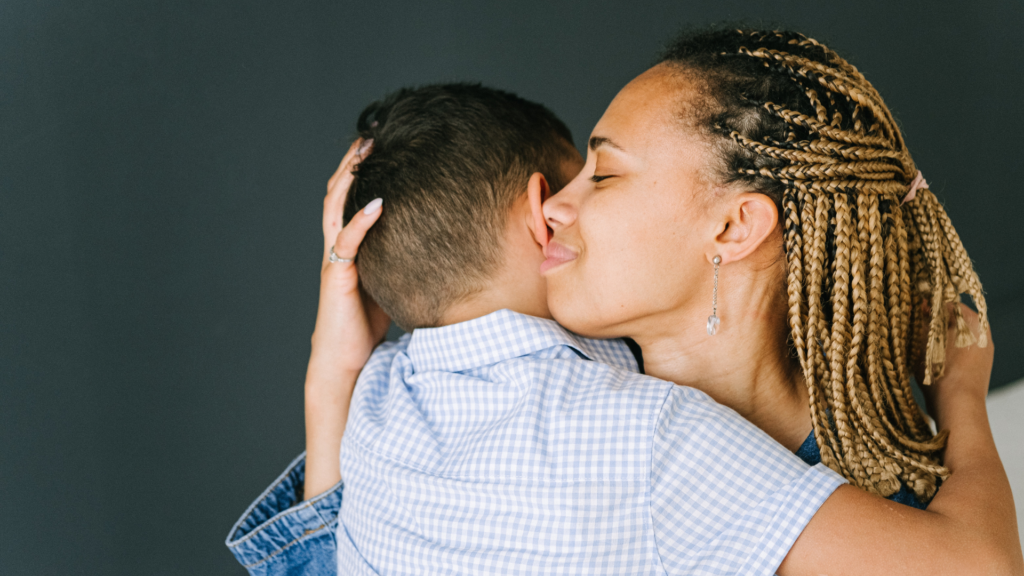
Mindset Tip #6: A Tantrum Is An Opportunity To Connect With Your Child
How amazing would it be to use a tantrum as the time to reconnect with your child on a deeper level?
If you could tell yourself that instead of this being something I need to feel and shut down, you say, “Bring it on. This is a chance for me to show up and connect with my child and be the parent/caregiver I want to be. This is what I want them to remember.”
I remember when my mom would tell me, “Jazzy, I love you when you’re mad. I love you when you’re sad. I love you when you’re angry. I love you regardless of your feelings.” And that helped me as a child and I still think about it to this day.
You don’t want your child to remember that you used to lose it – “Mommy/Daddy used to tell me to stop crying.”
We want them to remember feeling deeply connected with you – “Mom/Dad never judged me for my feelings. And in fact, she/he loved me regardless of my feelings, and I can show up for this.”
The time our child needs our love and connection the most is when they’re experiencing intense emotions and feeling out of control. Our unconditional love is what anchors them in the storm.
So remind yourself: Tantrums are opportunities to connect.

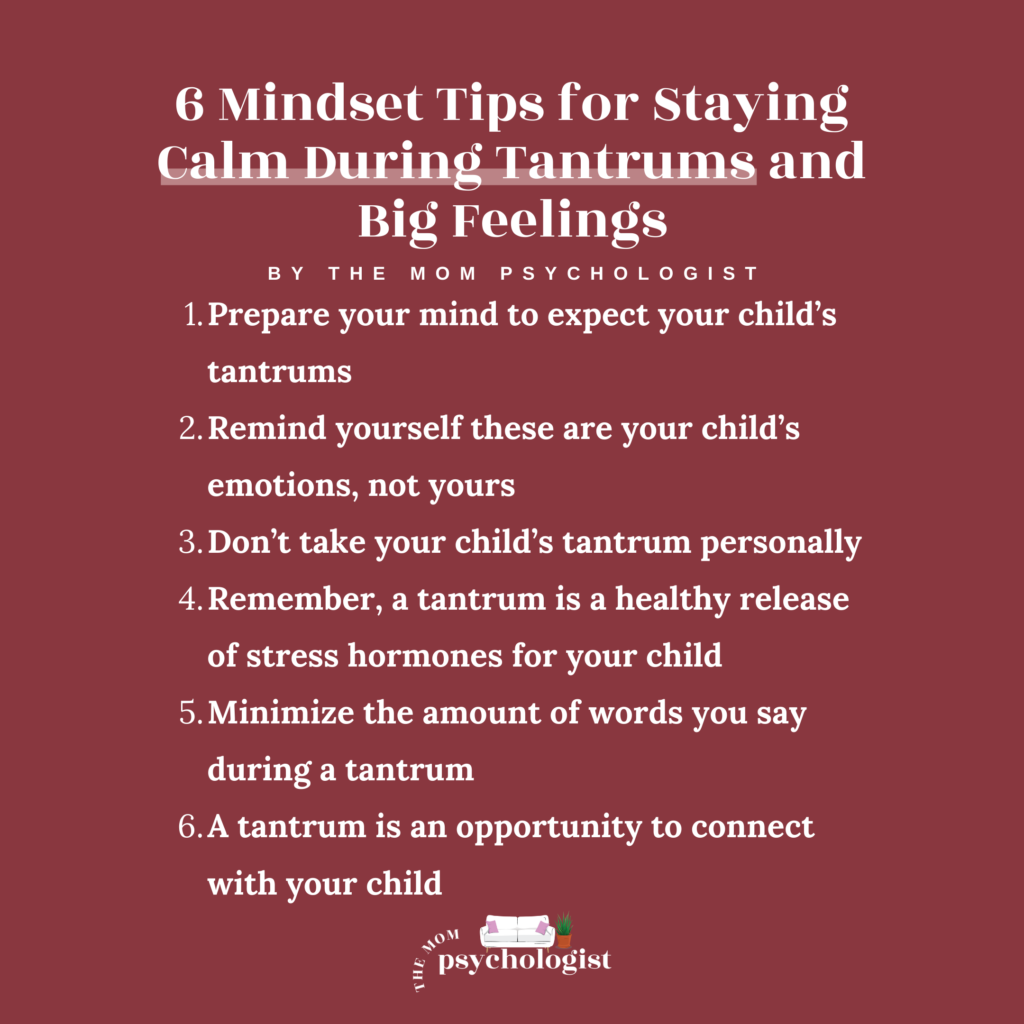
How you handle your child’s tantrum is by having the right mindset and trusting the process.
Now, you’re not going to always show up as your best self. You’re not always going to get it right. Myself, included – I don’t always get this right. My mom didn’t always get it right. She wasn’t always perfect. None of us are perfect parents.
But the more you practice how you respond and show up, the more it’ll become second nature. Have a few mantras you fall back on during tantrums, remembering that those are for you rather than your child.
And forgive yourself when you don’t get it right.
We’re all human. We are all imperfect and sometimes we get overwhelmed.
But when it happens, give yourself compassion and then get right back up and try again – just like you would encourage your child to do.
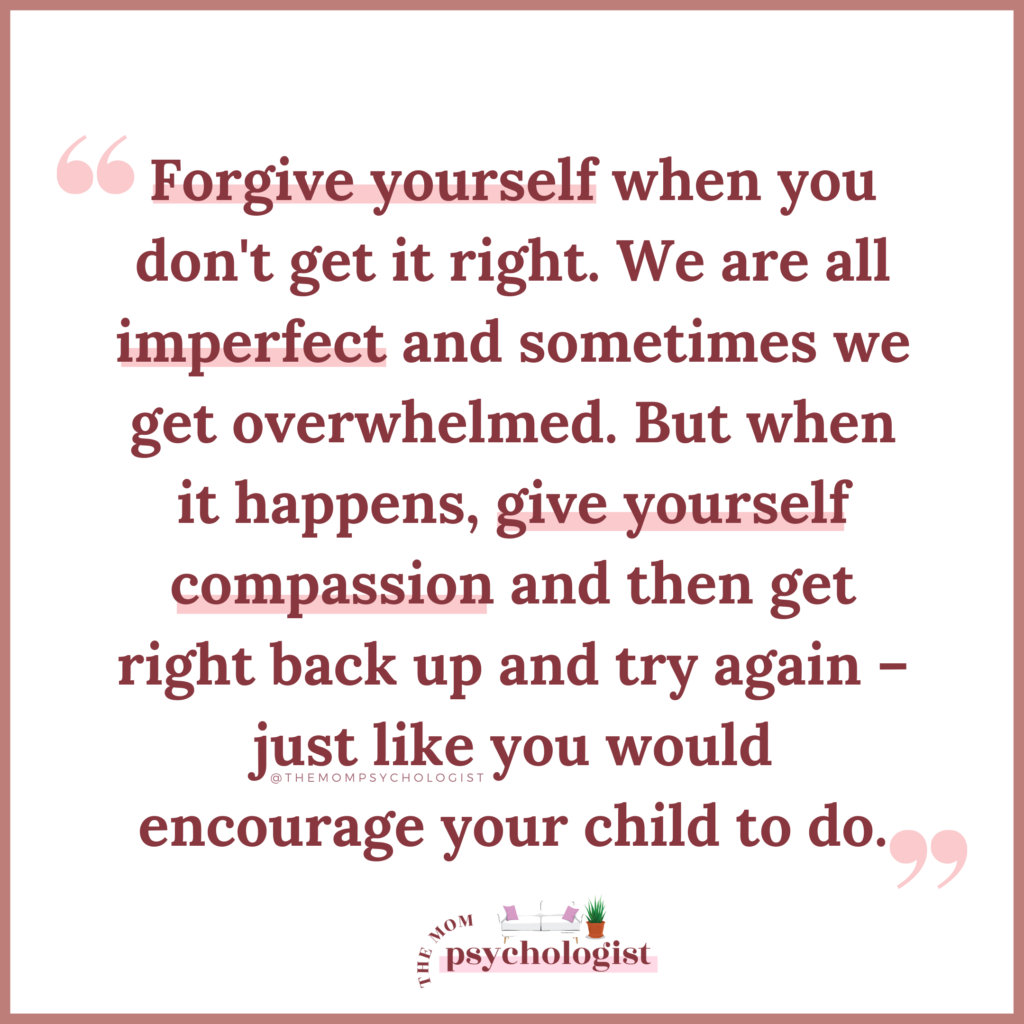
You’ve got this,
Dr. Jazmine
P.S. Ever wonder what type of parent you are? Like do you tend to be more permissive, authoritarian, or do you strike a balance between love & limits ( authoritative)?
Take my Parenting Style Quiz and find out! All you need is 2 minutes and an email address.
Once you complete the quiz, I’ll send you a personalized report and video with your results. You’ll receive several resources that will help you grow to create more cooperation and connection.
Love this? Don’t lose it! Chick below to save it to your Pinterest!
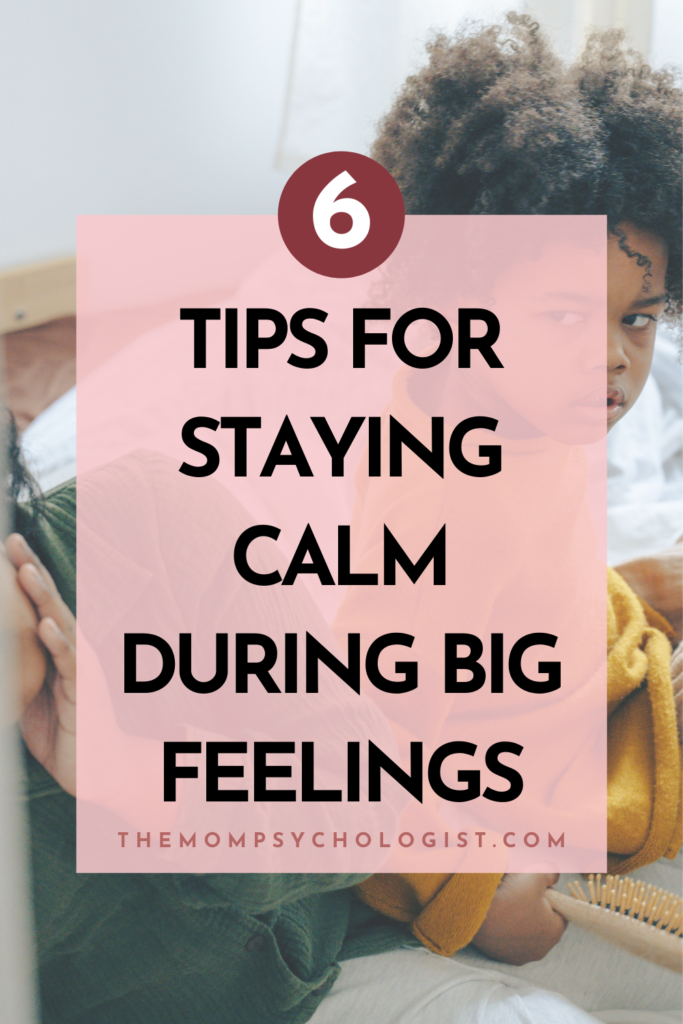
Leave a Reply Cancel reply
Copyright The Mom Psychologist® 2025
grab my free script pack!
explore
work with me
information
About
Blog
YouTube
Podcast
Discipline Course
TMP University (Coaching)
Privacy Policy
Terms of Use
Product Disclaimer
Contact
TMP Times (Newsletter)

